University Mental Health Nursing: Collaborative Practice Report
VerifiedAdded on 2022/11/17
|10
|2852
|355
Report
AI Summary
This report delves into collaborative mental health nursing practice, emphasizing the significance of the nurse-consumer relationship and the patient's lived experiences. It explores the necessity for mental health nurses to understand the consumer's perspective to develop a collaborative and person-centered approach. The report identifies communication skills as a critical aspect needing improvement, hindering effective teamwork and patient interaction. It discusses the impact of poor communication on patient safety, ethical considerations, and the ability to build rapport. The report suggests strategies for improvement, including participation in meetings, maintaining detailed patient records, and fostering open communication within the team. The conclusion reinforces the benefits of collaborative practice in enhancing patient care and professional development. It also provides an overview of the interprofessional team and the importance of effective communication. The report references several research papers to support the arguments.
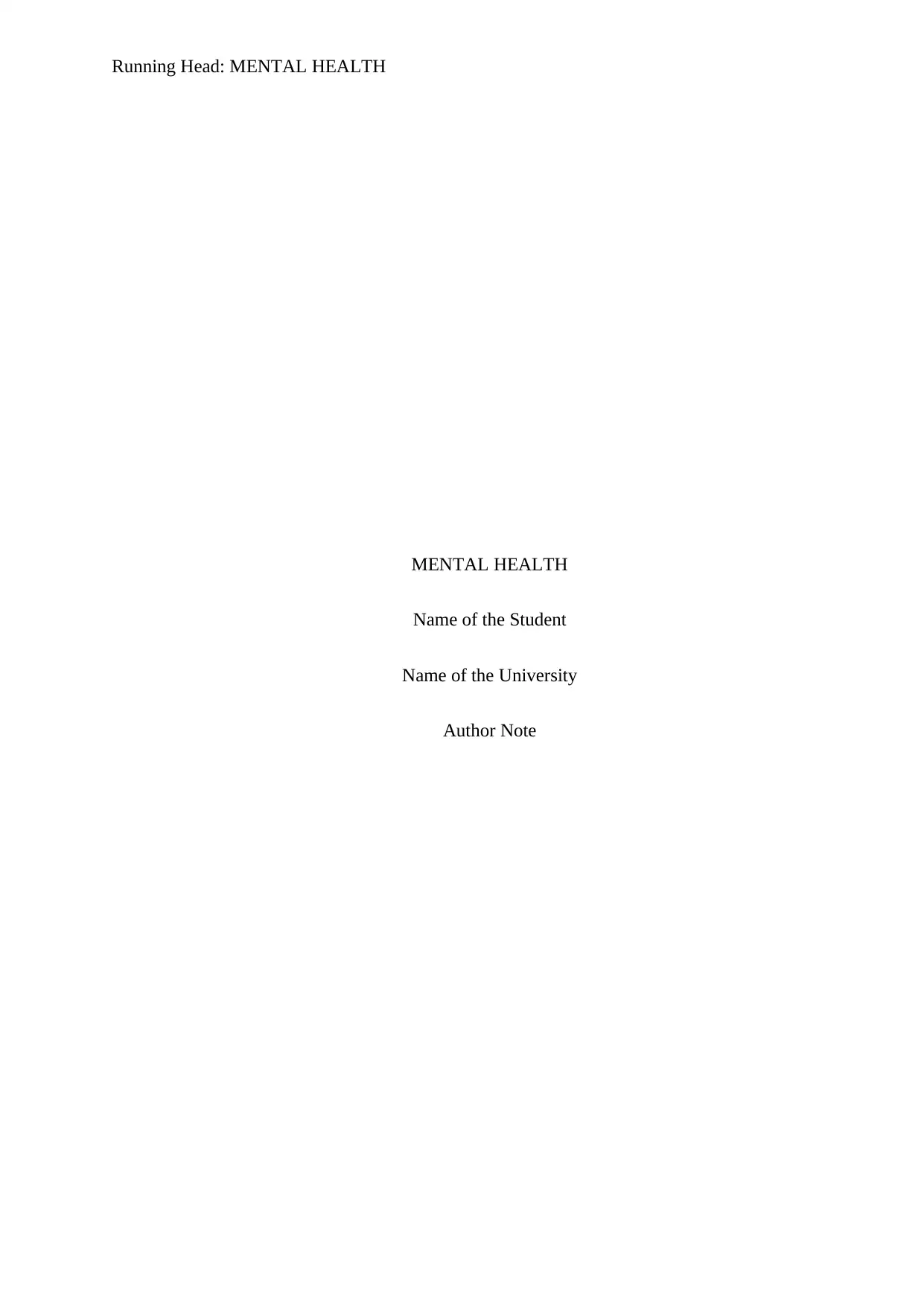
Running Head: MENTAL HEALTH
MENTAL HEALTH
Name of the Student
Name of the University
Author Note
MENTAL HEALTH
Name of the Student
Name of the University
Author Note
Paraphrase This Document
Need a fresh take? Get an instant paraphrase of this document with our AI Paraphraser
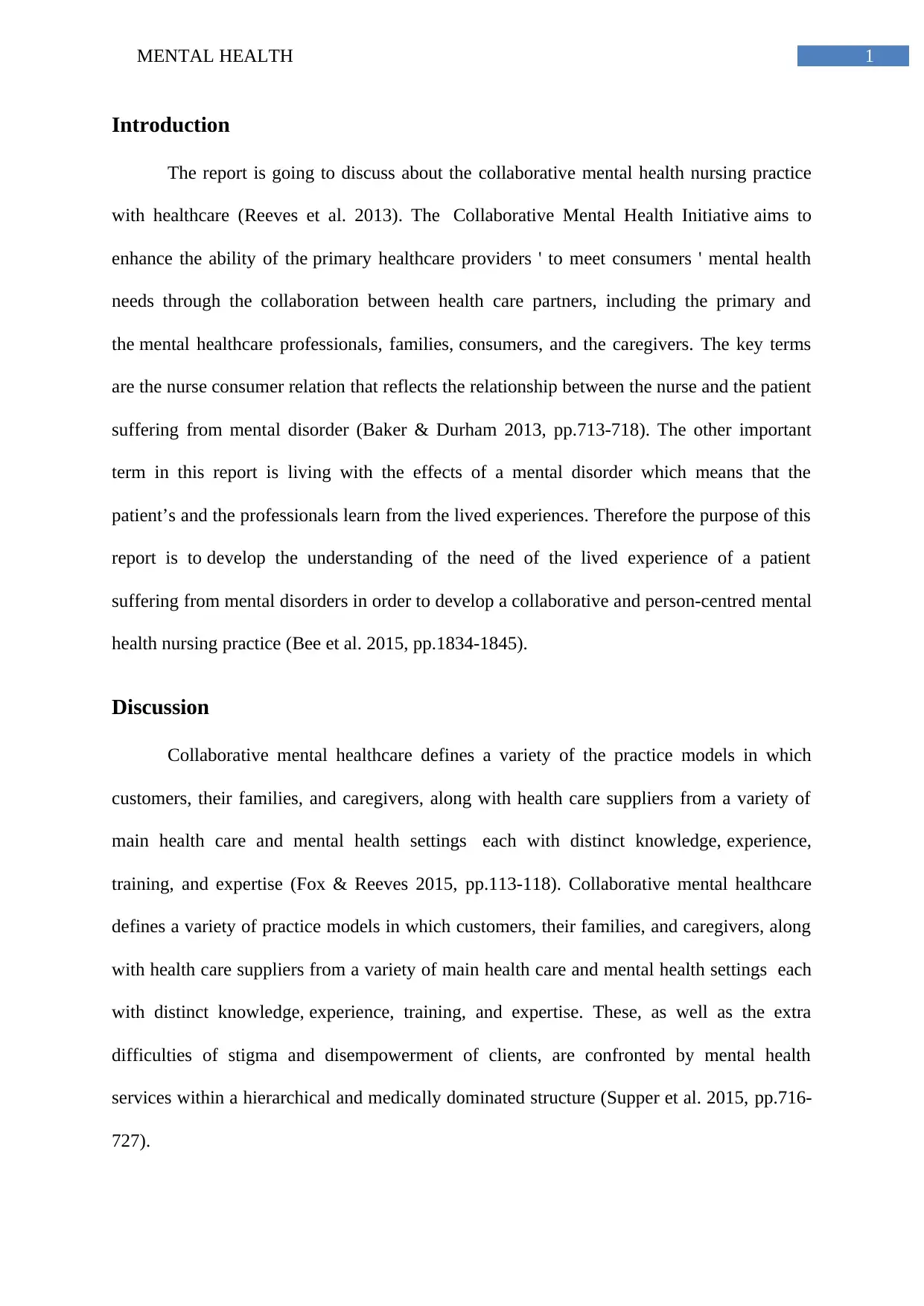
1MENTAL HEALTH
Introduction
The report is going to discuss about the collaborative mental health nursing practice
with healthcare (Reeves et al. 2013). The Collaborative Mental Health Initiative aims to
enhance the ability of the primary healthcare providers ' to meet consumers ' mental health
needs through the collaboration between health care partners, including the primary and
the mental healthcare professionals, families, consumers, and the caregivers. The key terms
are the nurse consumer relation that reflects the relationship between the nurse and the patient
suffering from mental disorder (Baker & Durham 2013, pp.713-718). The other important
term in this report is living with the effects of a mental disorder which means that the
patient’s and the professionals learn from the lived experiences. Therefore the purpose of this
report is to develop the understanding of the need of the lived experience of a patient
suffering from mental disorders in order to develop a collaborative and person-centred mental
health nursing practice (Bee et al. 2015, pp.1834-1845).
Discussion
Collaborative mental healthcare defines a variety of the practice models in which
customers, their families, and caregivers, along with health care suppliers from a variety of
main health care and mental health settings each with distinct knowledge, experience,
training, and expertise (Fox & Reeves 2015, pp.113-118). Collaborative mental healthcare
defines a variety of practice models in which customers, their families, and caregivers, along
with health care suppliers from a variety of main health care and mental health settings each
with distinct knowledge, experience, training, and expertise. These, as well as the extra
difficulties of stigma and disempowerment of clients, are confronted by mental health
services within a hierarchical and medically dominated structure (Supper et al. 2015, pp.716-
727).
Introduction
The report is going to discuss about the collaborative mental health nursing practice
with healthcare (Reeves et al. 2013). The Collaborative Mental Health Initiative aims to
enhance the ability of the primary healthcare providers ' to meet consumers ' mental health
needs through the collaboration between health care partners, including the primary and
the mental healthcare professionals, families, consumers, and the caregivers. The key terms
are the nurse consumer relation that reflects the relationship between the nurse and the patient
suffering from mental disorder (Baker & Durham 2013, pp.713-718). The other important
term in this report is living with the effects of a mental disorder which means that the
patient’s and the professionals learn from the lived experiences. Therefore the purpose of this
report is to develop the understanding of the need of the lived experience of a patient
suffering from mental disorders in order to develop a collaborative and person-centred mental
health nursing practice (Bee et al. 2015, pp.1834-1845).
Discussion
Collaborative mental healthcare defines a variety of the practice models in which
customers, their families, and caregivers, along with health care suppliers from a variety of
main health care and mental health settings each with distinct knowledge, experience,
training, and expertise (Fox & Reeves 2015, pp.113-118). Collaborative mental healthcare
defines a variety of practice models in which customers, their families, and caregivers, along
with health care suppliers from a variety of main health care and mental health settings each
with distinct knowledge, experience, training, and expertise. These, as well as the extra
difficulties of stigma and disempowerment of clients, are confronted by mental health
services within a hierarchical and medically dominated structure (Supper et al. 2015, pp.716-
727).
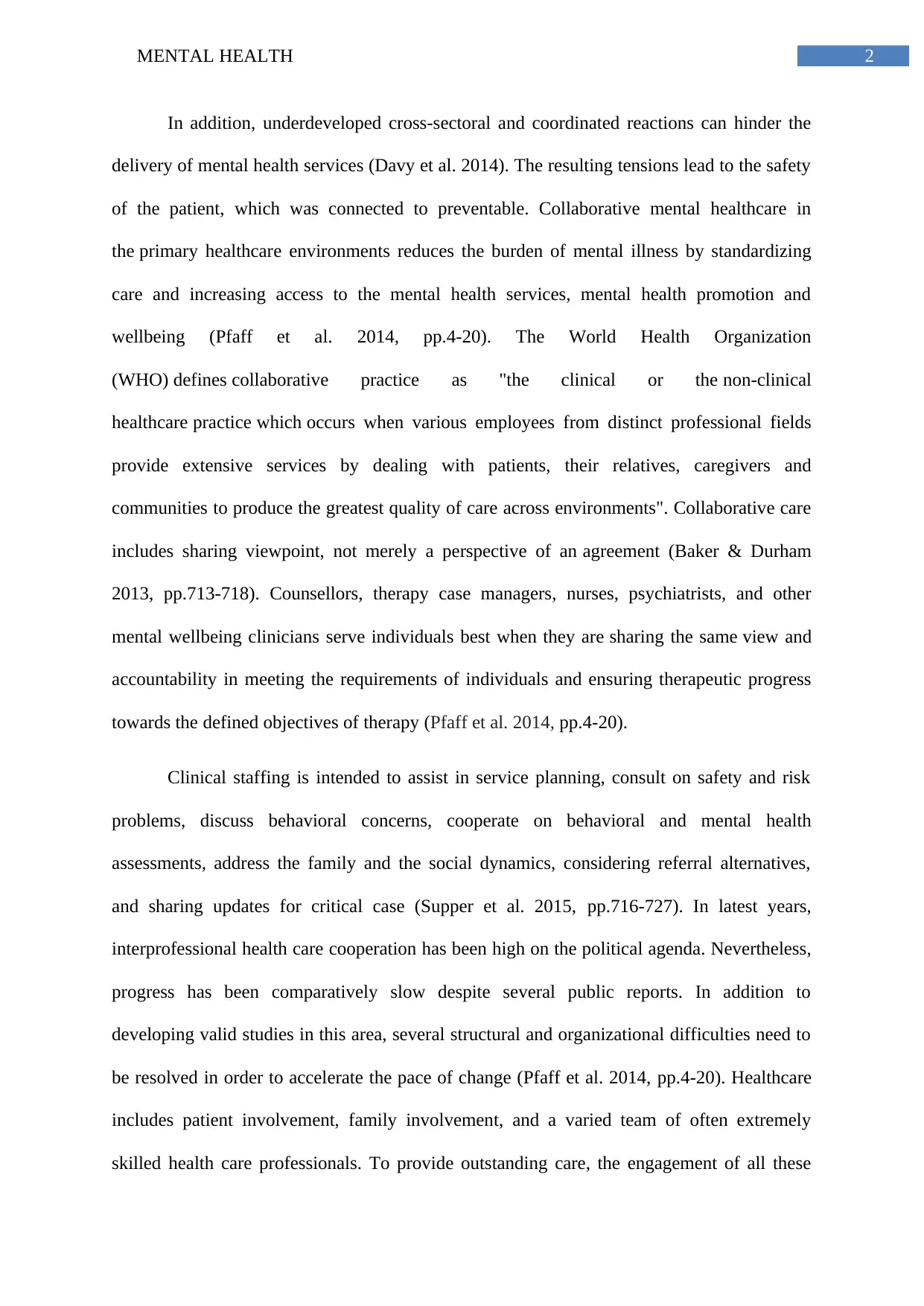
2MENTAL HEALTH
In addition, underdeveloped cross-sectoral and coordinated reactions can hinder the
delivery of mental health services (Davy et al. 2014). The resulting tensions lead to the safety
of the patient, which was connected to preventable. Collaborative mental healthcare in
the primary healthcare environments reduces the burden of mental illness by standardizing
care and increasing access to the mental health services, mental health promotion and
wellbeing (Pfaff et al. 2014, pp.4-20). The World Health Organization
(WHO) defines collaborative practice as "the clinical or the non-clinical
healthcare practice which occurs when various employees from distinct professional fields
provide extensive services by dealing with patients, their relatives, caregivers and
communities to produce the greatest quality of care across environments". Collaborative care
includes sharing viewpoint, not merely a perspective of an agreement (Baker & Durham
2013, pp.713-718). Counsellors, therapy case managers, nurses, psychiatrists, and other
mental wellbeing clinicians serve individuals best when they are sharing the same view and
accountability in meeting the requirements of individuals and ensuring therapeutic progress
towards the defined objectives of therapy (Pfaff et al. 2014, pp.4-20).
Clinical staffing is intended to assist in service planning, consult on safety and risk
problems, discuss behavioral concerns, cooperate on behavioral and mental health
assessments, address the family and the social dynamics, considering referral alternatives,
and sharing updates for critical case (Supper et al. 2015, pp.716-727). In latest years,
interprofessional health care cooperation has been high on the political agenda. Nevertheless,
progress has been comparatively slow despite several public reports. In addition to
developing valid studies in this area, several structural and organizational difficulties need to
be resolved in order to accelerate the pace of change (Pfaff et al. 2014, pp.4-20). Healthcare
includes patient involvement, family involvement, and a varied team of often extremely
skilled health care professionals. To provide outstanding care, the engagement of all these
In addition, underdeveloped cross-sectoral and coordinated reactions can hinder the
delivery of mental health services (Davy et al. 2014). The resulting tensions lead to the safety
of the patient, which was connected to preventable. Collaborative mental healthcare in
the primary healthcare environments reduces the burden of mental illness by standardizing
care and increasing access to the mental health services, mental health promotion and
wellbeing (Pfaff et al. 2014, pp.4-20). The World Health Organization
(WHO) defines collaborative practice as "the clinical or the non-clinical
healthcare practice which occurs when various employees from distinct professional fields
provide extensive services by dealing with patients, their relatives, caregivers and
communities to produce the greatest quality of care across environments". Collaborative care
includes sharing viewpoint, not merely a perspective of an agreement (Baker & Durham
2013, pp.713-718). Counsellors, therapy case managers, nurses, psychiatrists, and other
mental wellbeing clinicians serve individuals best when they are sharing the same view and
accountability in meeting the requirements of individuals and ensuring therapeutic progress
towards the defined objectives of therapy (Pfaff et al. 2014, pp.4-20).
Clinical staffing is intended to assist in service planning, consult on safety and risk
problems, discuss behavioral concerns, cooperate on behavioral and mental health
assessments, address the family and the social dynamics, considering referral alternatives,
and sharing updates for critical case (Supper et al. 2015, pp.716-727). In latest years,
interprofessional health care cooperation has been high on the political agenda. Nevertheless,
progress has been comparatively slow despite several public reports. In addition to
developing valid studies in this area, several structural and organizational difficulties need to
be resolved in order to accelerate the pace of change (Pfaff et al. 2014, pp.4-20). Healthcare
includes patient involvement, family involvement, and a varied team of often extremely
skilled health care professionals. To provide outstanding care, the engagement of all these
⊘ This is a preview!⊘
Do you want full access?
Subscribe today to unlock all pages.

Trusted by 1+ million students worldwide
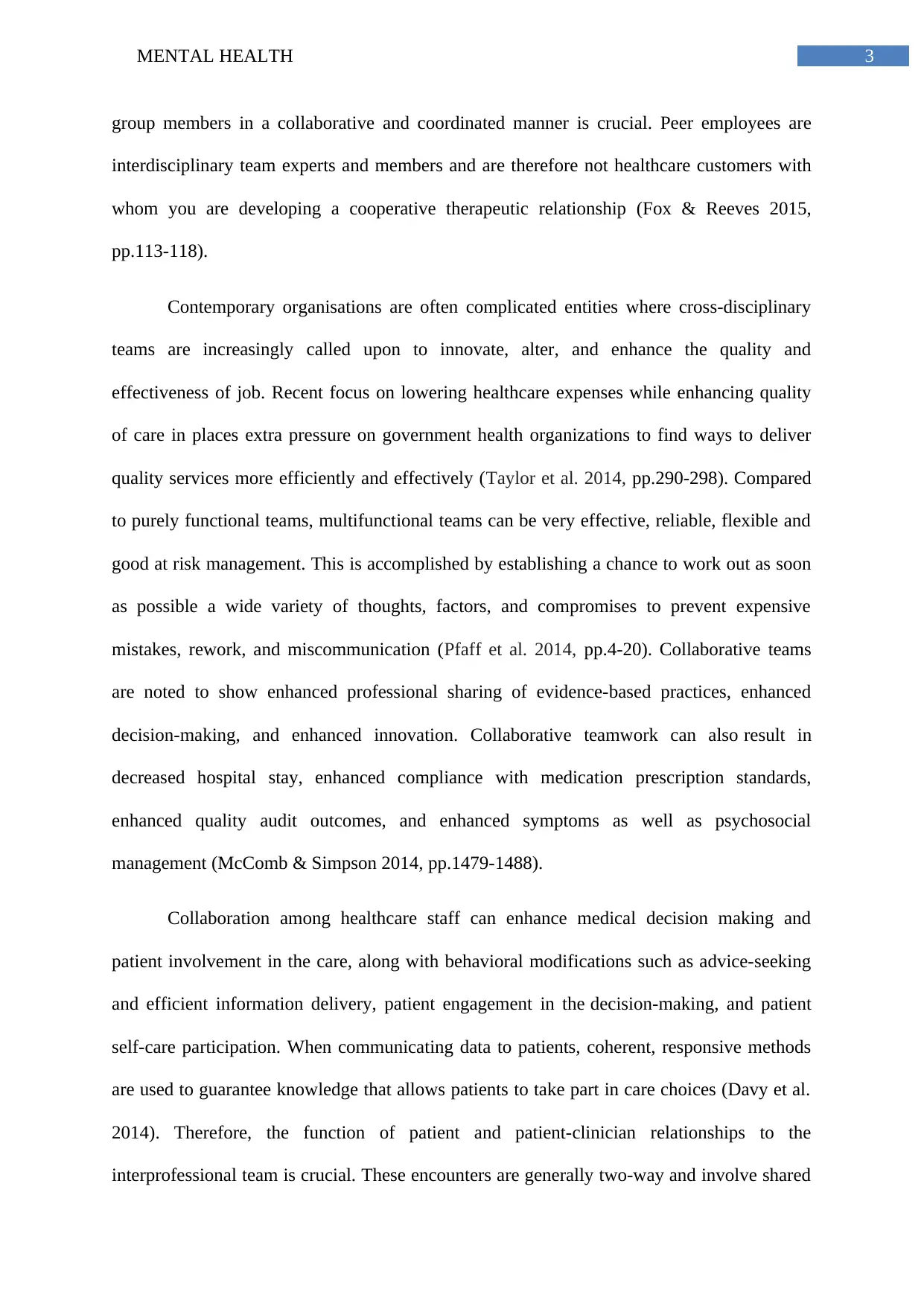
3MENTAL HEALTH
group members in a collaborative and coordinated manner is crucial. Peer employees are
interdisciplinary team experts and members and are therefore not healthcare customers with
whom you are developing a cooperative therapeutic relationship (Fox & Reeves 2015,
pp.113-118).
Contemporary organisations are often complicated entities where cross-disciplinary
teams are increasingly called upon to innovate, alter, and enhance the quality and
effectiveness of job. Recent focus on lowering healthcare expenses while enhancing quality
of care in places extra pressure on government health organizations to find ways to deliver
quality services more efficiently and effectively (Taylor et al. 2014, pp.290-298). Compared
to purely functional teams, multifunctional teams can be very effective, reliable, flexible and
good at risk management. This is accomplished by establishing a chance to work out as soon
as possible a wide variety of thoughts, factors, and compromises to prevent expensive
mistakes, rework, and miscommunication (Pfaff et al. 2014, pp.4-20). Collaborative teams
are noted to show enhanced professional sharing of evidence-based practices, enhanced
decision-making, and enhanced innovation. Collaborative teamwork can also result in
decreased hospital stay, enhanced compliance with medication prescription standards,
enhanced quality audit outcomes, and enhanced symptoms as well as psychosocial
management (McComb & Simpson 2014, pp.1479-1488).
Collaboration among healthcare staff can enhance medical decision making and
patient involvement in the care, along with behavioral modifications such as advice-seeking
and efficient information delivery, patient engagement in the decision-making, and patient
self-care participation. When communicating data to patients, coherent, responsive methods
are used to guarantee knowledge that allows patients to take part in care choices (Davy et al.
2014). Therefore, the function of patient and patient-clinician relationships to the
interprofessional team is crucial. These encounters are generally two-way and involve shared
group members in a collaborative and coordinated manner is crucial. Peer employees are
interdisciplinary team experts and members and are therefore not healthcare customers with
whom you are developing a cooperative therapeutic relationship (Fox & Reeves 2015,
pp.113-118).
Contemporary organisations are often complicated entities where cross-disciplinary
teams are increasingly called upon to innovate, alter, and enhance the quality and
effectiveness of job. Recent focus on lowering healthcare expenses while enhancing quality
of care in places extra pressure on government health organizations to find ways to deliver
quality services more efficiently and effectively (Taylor et al. 2014, pp.290-298). Compared
to purely functional teams, multifunctional teams can be very effective, reliable, flexible and
good at risk management. This is accomplished by establishing a chance to work out as soon
as possible a wide variety of thoughts, factors, and compromises to prevent expensive
mistakes, rework, and miscommunication (Pfaff et al. 2014, pp.4-20). Collaborative teams
are noted to show enhanced professional sharing of evidence-based practices, enhanced
decision-making, and enhanced innovation. Collaborative teamwork can also result in
decreased hospital stay, enhanced compliance with medication prescription standards,
enhanced quality audit outcomes, and enhanced symptoms as well as psychosocial
management (McComb & Simpson 2014, pp.1479-1488).
Collaboration among healthcare staff can enhance medical decision making and
patient involvement in the care, along with behavioral modifications such as advice-seeking
and efficient information delivery, patient engagement in the decision-making, and patient
self-care participation. When communicating data to patients, coherent, responsive methods
are used to guarantee knowledge that allows patients to take part in care choices (Davy et al.
2014). Therefore, the function of patient and patient-clinician relationships to the
interprofessional team is crucial. These encounters are generally two-way and involve shared
Paraphrase This Document
Need a fresh take? Get an instant paraphrase of this document with our AI Paraphraser
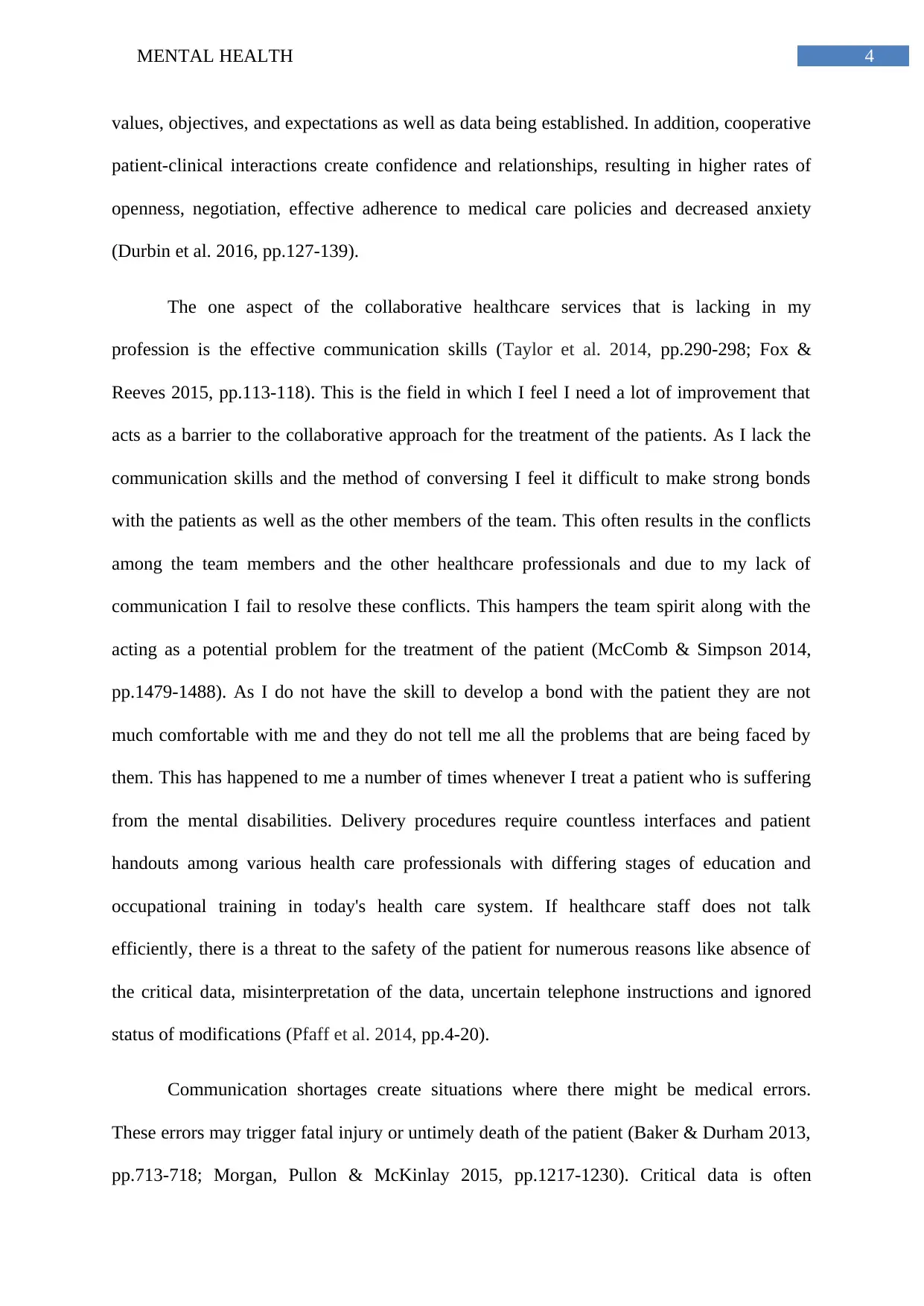
4MENTAL HEALTH
values, objectives, and expectations as well as data being established. In addition, cooperative
patient-clinical interactions create confidence and relationships, resulting in higher rates of
openness, negotiation, effective adherence to medical care policies and decreased anxiety
(Durbin et al. 2016, pp.127-139).
The one aspect of the collaborative healthcare services that is lacking in my
profession is the effective communication skills (Taylor et al. 2014, pp.290-298; Fox &
Reeves 2015, pp.113-118). This is the field in which I feel I need a lot of improvement that
acts as a barrier to the collaborative approach for the treatment of the patients. As I lack the
communication skills and the method of conversing I feel it difficult to make strong bonds
with the patients as well as the other members of the team. This often results in the conflicts
among the team members and the other healthcare professionals and due to my lack of
communication I fail to resolve these conflicts. This hampers the team spirit along with the
acting as a potential problem for the treatment of the patient (McComb & Simpson 2014,
pp.1479-1488). As I do not have the skill to develop a bond with the patient they are not
much comfortable with me and they do not tell me all the problems that are being faced by
them. This has happened to me a number of times whenever I treat a patient who is suffering
from the mental disabilities. Delivery procedures require countless interfaces and patient
handouts among various health care professionals with differing stages of education and
occupational training in today's health care system. If healthcare staff does not talk
efficiently, there is a threat to the safety of the patient for numerous reasons like absence of
the critical data, misinterpretation of the data, uncertain telephone instructions and ignored
status of modifications (Pfaff et al. 2014, pp.4-20).
Communication shortages create situations where there might be medical errors.
These errors may trigger fatal injury or untimely death of the patient (Baker & Durham 2013,
pp.713-718; Morgan, Pullon & McKinlay 2015, pp.1217-1230). Critical data is often
values, objectives, and expectations as well as data being established. In addition, cooperative
patient-clinical interactions create confidence and relationships, resulting in higher rates of
openness, negotiation, effective adherence to medical care policies and decreased anxiety
(Durbin et al. 2016, pp.127-139).
The one aspect of the collaborative healthcare services that is lacking in my
profession is the effective communication skills (Taylor et al. 2014, pp.290-298; Fox &
Reeves 2015, pp.113-118). This is the field in which I feel I need a lot of improvement that
acts as a barrier to the collaborative approach for the treatment of the patients. As I lack the
communication skills and the method of conversing I feel it difficult to make strong bonds
with the patients as well as the other members of the team. This often results in the conflicts
among the team members and the other healthcare professionals and due to my lack of
communication I fail to resolve these conflicts. This hampers the team spirit along with the
acting as a potential problem for the treatment of the patient (McComb & Simpson 2014,
pp.1479-1488). As I do not have the skill to develop a bond with the patient they are not
much comfortable with me and they do not tell me all the problems that are being faced by
them. This has happened to me a number of times whenever I treat a patient who is suffering
from the mental disabilities. Delivery procedures require countless interfaces and patient
handouts among various health care professionals with differing stages of education and
occupational training in today's health care system. If healthcare staff does not talk
efficiently, there is a threat to the safety of the patient for numerous reasons like absence of
the critical data, misinterpretation of the data, uncertain telephone instructions and ignored
status of modifications (Pfaff et al. 2014, pp.4-20).
Communication shortages create situations where there might be medical errors.
These errors may trigger fatal injury or untimely death of the patient (Baker & Durham 2013,
pp.713-718; Morgan, Pullon & McKinlay 2015, pp.1217-1230). Critical data is often
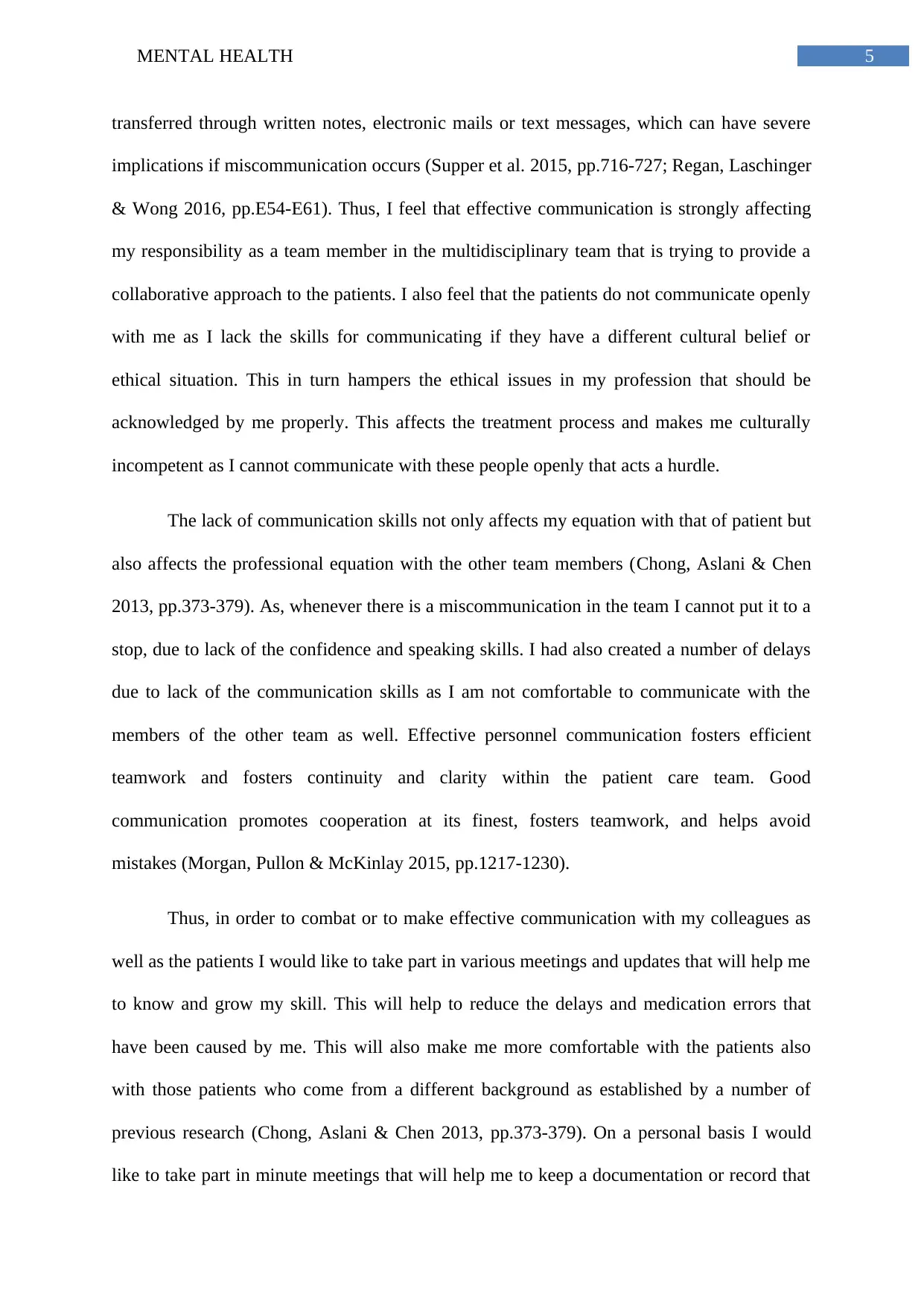
5MENTAL HEALTH
transferred through written notes, electronic mails or text messages, which can have severe
implications if miscommunication occurs (Supper et al. 2015, pp.716-727; Regan, Laschinger
& Wong 2016, pp.E54-E61). Thus, I feel that effective communication is strongly affecting
my responsibility as a team member in the multidisciplinary team that is trying to provide a
collaborative approach to the patients. I also feel that the patients do not communicate openly
with me as I lack the skills for communicating if they have a different cultural belief or
ethical situation. This in turn hampers the ethical issues in my profession that should be
acknowledged by me properly. This affects the treatment process and makes me culturally
incompetent as I cannot communicate with these people openly that acts a hurdle.
The lack of communication skills not only affects my equation with that of patient but
also affects the professional equation with the other team members (Chong, Aslani & Chen
2013, pp.373-379). As, whenever there is a miscommunication in the team I cannot put it to a
stop, due to lack of the confidence and speaking skills. I had also created a number of delays
due to lack of the communication skills as I am not comfortable to communicate with the
members of the other team as well. Effective personnel communication fosters efficient
teamwork and fosters continuity and clarity within the patient care team. Good
communication promotes cooperation at its finest, fosters teamwork, and helps avoid
mistakes (Morgan, Pullon & McKinlay 2015, pp.1217-1230).
Thus, in order to combat or to make effective communication with my colleagues as
well as the patients I would like to take part in various meetings and updates that will help me
to know and grow my skill. This will help to reduce the delays and medication errors that
have been caused by me. This will also make me more comfortable with the patients also
with those patients who come from a different background as established by a number of
previous research (Chong, Aslani & Chen 2013, pp.373-379). On a personal basis I would
like to take part in minute meetings that will help me to keep a documentation or record that
transferred through written notes, electronic mails or text messages, which can have severe
implications if miscommunication occurs (Supper et al. 2015, pp.716-727; Regan, Laschinger
& Wong 2016, pp.E54-E61). Thus, I feel that effective communication is strongly affecting
my responsibility as a team member in the multidisciplinary team that is trying to provide a
collaborative approach to the patients. I also feel that the patients do not communicate openly
with me as I lack the skills for communicating if they have a different cultural belief or
ethical situation. This in turn hampers the ethical issues in my profession that should be
acknowledged by me properly. This affects the treatment process and makes me culturally
incompetent as I cannot communicate with these people openly that acts a hurdle.
The lack of communication skills not only affects my equation with that of patient but
also affects the professional equation with the other team members (Chong, Aslani & Chen
2013, pp.373-379). As, whenever there is a miscommunication in the team I cannot put it to a
stop, due to lack of the confidence and speaking skills. I had also created a number of delays
due to lack of the communication skills as I am not comfortable to communicate with the
members of the other team as well. Effective personnel communication fosters efficient
teamwork and fosters continuity and clarity within the patient care team. Good
communication promotes cooperation at its finest, fosters teamwork, and helps avoid
mistakes (Morgan, Pullon & McKinlay 2015, pp.1217-1230).
Thus, in order to combat or to make effective communication with my colleagues as
well as the patients I would like to take part in various meetings and updates that will help me
to know and grow my skill. This will help to reduce the delays and medication errors that
have been caused by me. This will also make me more comfortable with the patients also
with those patients who come from a different background as established by a number of
previous research (Chong, Aslani & Chen 2013, pp.373-379). On a personal basis I would
like to take part in minute meetings that will help me to keep a documentation or record that
⊘ This is a preview!⊘
Do you want full access?
Subscribe today to unlock all pages.

Trusted by 1+ million students worldwide
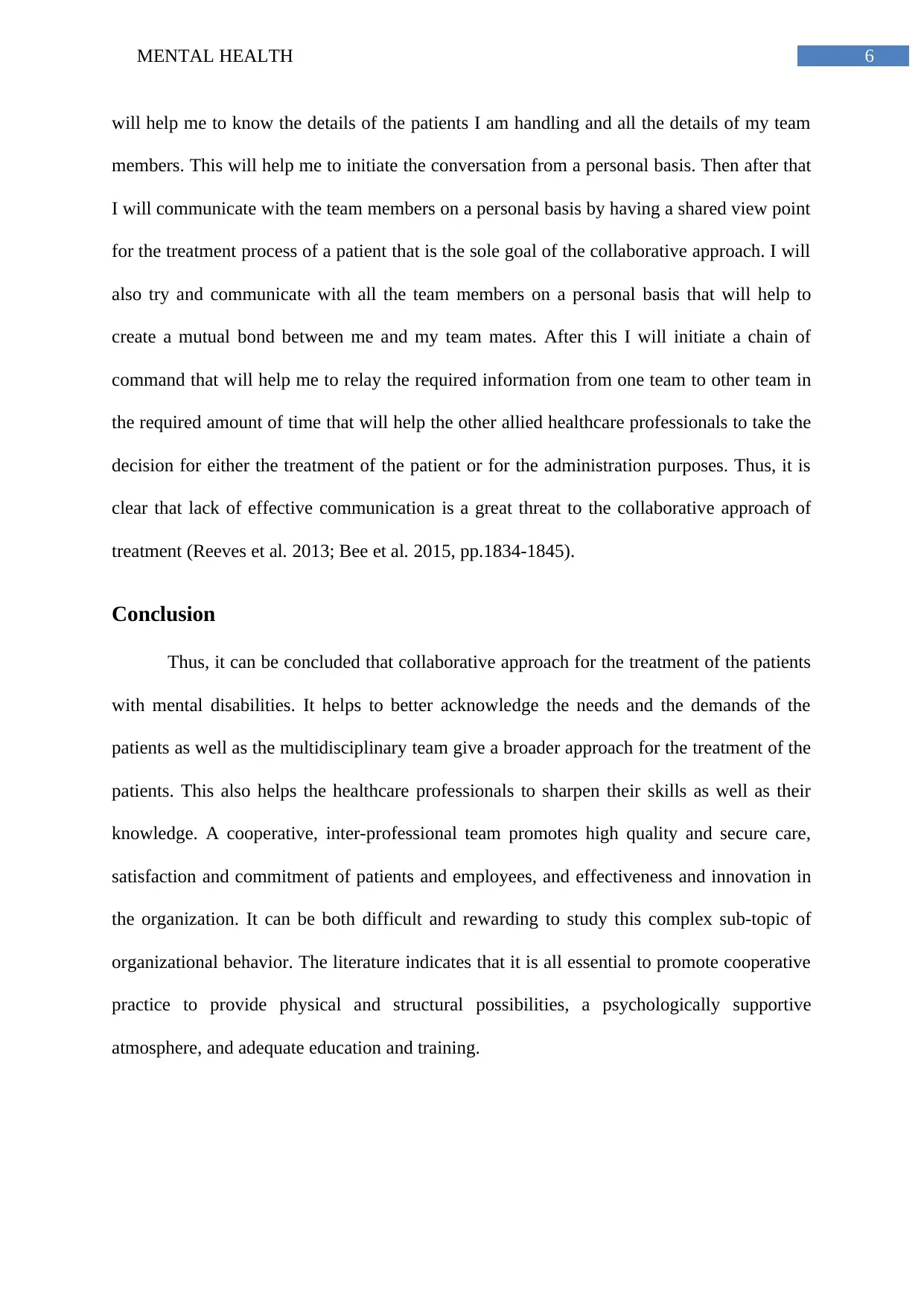
6MENTAL HEALTH
will help me to know the details of the patients I am handling and all the details of my team
members. This will help me to initiate the conversation from a personal basis. Then after that
I will communicate with the team members on a personal basis by having a shared view point
for the treatment process of a patient that is the sole goal of the collaborative approach. I will
also try and communicate with all the team members on a personal basis that will help to
create a mutual bond between me and my team mates. After this I will initiate a chain of
command that will help me to relay the required information from one team to other team in
the required amount of time that will help the other allied healthcare professionals to take the
decision for either the treatment of the patient or for the administration purposes. Thus, it is
clear that lack of effective communication is a great threat to the collaborative approach of
treatment (Reeves et al. 2013; Bee et al. 2015, pp.1834-1845).
Conclusion
Thus, it can be concluded that collaborative approach for the treatment of the patients
with mental disabilities. It helps to better acknowledge the needs and the demands of the
patients as well as the multidisciplinary team give a broader approach for the treatment of the
patients. This also helps the healthcare professionals to sharpen their skills as well as their
knowledge. A cooperative, inter-professional team promotes high quality and secure care,
satisfaction and commitment of patients and employees, and effectiveness and innovation in
the organization. It can be both difficult and rewarding to study this complex sub-topic of
organizational behavior. The literature indicates that it is all essential to promote cooperative
practice to provide physical and structural possibilities, a psychologically supportive
atmosphere, and adequate education and training.
will help me to know the details of the patients I am handling and all the details of my team
members. This will help me to initiate the conversation from a personal basis. Then after that
I will communicate with the team members on a personal basis by having a shared view point
for the treatment process of a patient that is the sole goal of the collaborative approach. I will
also try and communicate with all the team members on a personal basis that will help to
create a mutual bond between me and my team mates. After this I will initiate a chain of
command that will help me to relay the required information from one team to other team in
the required amount of time that will help the other allied healthcare professionals to take the
decision for either the treatment of the patient or for the administration purposes. Thus, it is
clear that lack of effective communication is a great threat to the collaborative approach of
treatment (Reeves et al. 2013; Bee et al. 2015, pp.1834-1845).
Conclusion
Thus, it can be concluded that collaborative approach for the treatment of the patients
with mental disabilities. It helps to better acknowledge the needs and the demands of the
patients as well as the multidisciplinary team give a broader approach for the treatment of the
patients. This also helps the healthcare professionals to sharpen their skills as well as their
knowledge. A cooperative, inter-professional team promotes high quality and secure care,
satisfaction and commitment of patients and employees, and effectiveness and innovation in
the organization. It can be both difficult and rewarding to study this complex sub-topic of
organizational behavior. The literature indicates that it is all essential to promote cooperative
practice to provide physical and structural possibilities, a psychologically supportive
atmosphere, and adequate education and training.
Paraphrase This Document
Need a fresh take? Get an instant paraphrase of this document with our AI Paraphraser
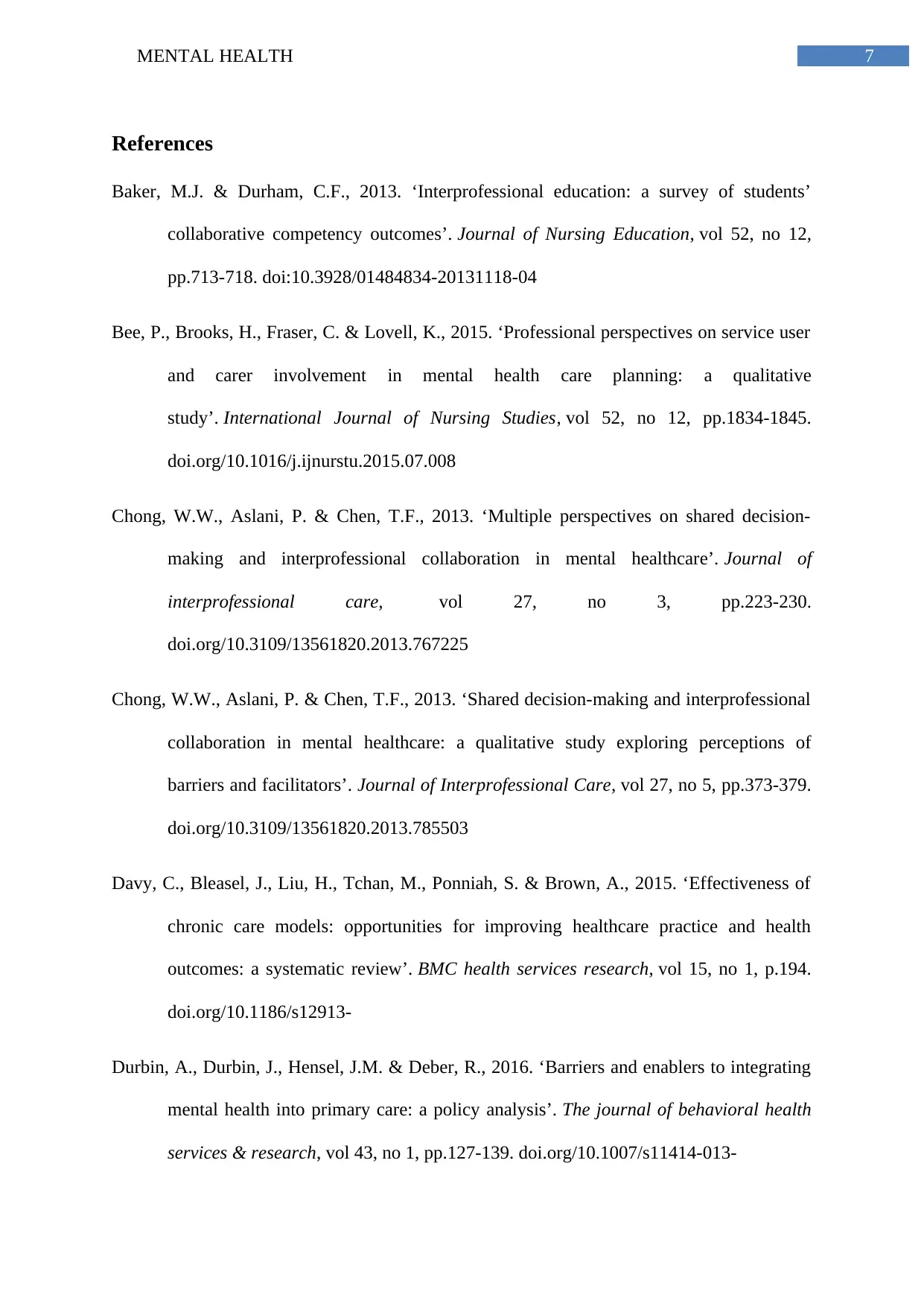
7MENTAL HEALTH
References
Baker, M.J. & Durham, C.F., 2013. ‘Interprofessional education: a survey of students’
collaborative competency outcomes’. Journal of Nursing Education, vol 52, no 12,
pp.713-718. doi:10.3928/01484834-20131118-04
Bee, P., Brooks, H., Fraser, C. & Lovell, K., 2015. ‘Professional perspectives on service user
and carer involvement in mental health care planning: a qualitative
study’. International Journal of Nursing Studies, vol 52, no 12, pp.1834-1845.
doi.org/10.1016/j.ijnurstu.2015.07.008
Chong, W.W., Aslani, P. & Chen, T.F., 2013. ‘Multiple perspectives on shared decision-
making and interprofessional collaboration in mental healthcare’. Journal of
interprofessional care, vol 27, no 3, pp.223-230.
doi.org/10.3109/13561820.2013.767225
Chong, W.W., Aslani, P. & Chen, T.F., 2013. ‘Shared decision-making and interprofessional
collaboration in mental healthcare: a qualitative study exploring perceptions of
barriers and facilitators’. Journal of Interprofessional Care, vol 27, no 5, pp.373-379.
doi.org/10.3109/13561820.2013.785503
Davy, C., Bleasel, J., Liu, H., Tchan, M., Ponniah, S. & Brown, A., 2015. ‘Effectiveness of
chronic care models: opportunities for improving healthcare practice and health
outcomes: a systematic review’. BMC health services research, vol 15, no 1, p.194.
doi.org/10.1186/s12913-
Durbin, A., Durbin, J., Hensel, J.M. & Deber, R., 2016. ‘Barriers and enablers to integrating
mental health into primary care: a policy analysis’. The journal of behavioral health
services & research, vol 43, no 1, pp.127-139. doi.org/10.1007/s11414-013-
References
Baker, M.J. & Durham, C.F., 2013. ‘Interprofessional education: a survey of students’
collaborative competency outcomes’. Journal of Nursing Education, vol 52, no 12,
pp.713-718. doi:10.3928/01484834-20131118-04
Bee, P., Brooks, H., Fraser, C. & Lovell, K., 2015. ‘Professional perspectives on service user
and carer involvement in mental health care planning: a qualitative
study’. International Journal of Nursing Studies, vol 52, no 12, pp.1834-1845.
doi.org/10.1016/j.ijnurstu.2015.07.008
Chong, W.W., Aslani, P. & Chen, T.F., 2013. ‘Multiple perspectives on shared decision-
making and interprofessional collaboration in mental healthcare’. Journal of
interprofessional care, vol 27, no 3, pp.223-230.
doi.org/10.3109/13561820.2013.767225
Chong, W.W., Aslani, P. & Chen, T.F., 2013. ‘Shared decision-making and interprofessional
collaboration in mental healthcare: a qualitative study exploring perceptions of
barriers and facilitators’. Journal of Interprofessional Care, vol 27, no 5, pp.373-379.
doi.org/10.3109/13561820.2013.785503
Davy, C., Bleasel, J., Liu, H., Tchan, M., Ponniah, S. & Brown, A., 2015. ‘Effectiveness of
chronic care models: opportunities for improving healthcare practice and health
outcomes: a systematic review’. BMC health services research, vol 15, no 1, p.194.
doi.org/10.1186/s12913-
Durbin, A., Durbin, J., Hensel, J.M. & Deber, R., 2016. ‘Barriers and enablers to integrating
mental health into primary care: a policy analysis’. The journal of behavioral health
services & research, vol 43, no 1, pp.127-139. doi.org/10.1007/s11414-013-
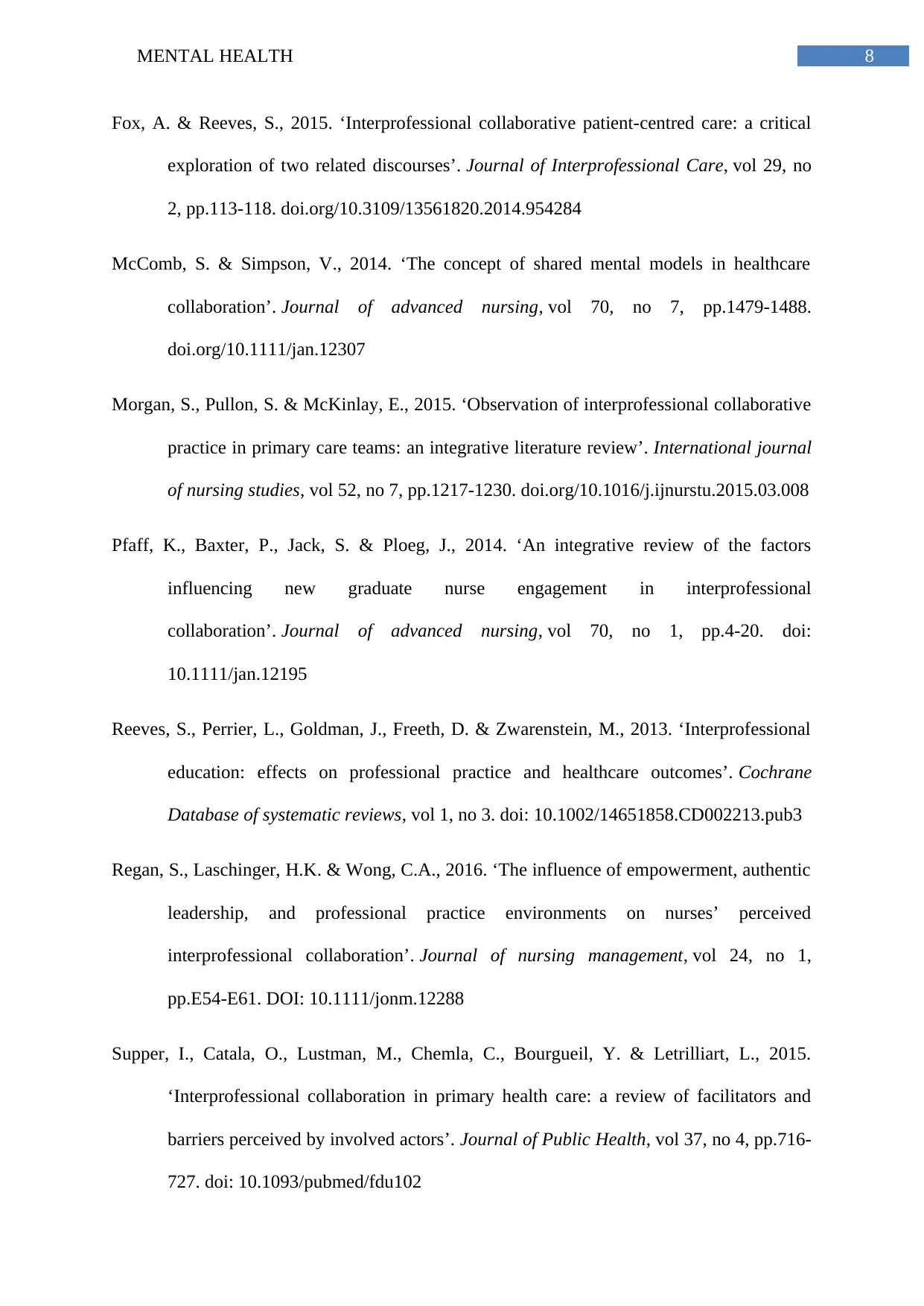
8MENTAL HEALTH
Fox, A. & Reeves, S., 2015. ‘Interprofessional collaborative patient-centred care: a critical
exploration of two related discourses’. Journal of Interprofessional Care, vol 29, no
2, pp.113-118. doi.org/10.3109/13561820.2014.954284
McComb, S. & Simpson, V., 2014. ‘The concept of shared mental models in healthcare
collaboration’. Journal of advanced nursing, vol 70, no 7, pp.1479-1488.
doi.org/10.1111/jan.12307
Morgan, S., Pullon, S. & McKinlay, E., 2015. ‘Observation of interprofessional collaborative
practice in primary care teams: an integrative literature review’. International journal
of nursing studies, vol 52, no 7, pp.1217-1230. doi.org/10.1016/j.ijnurstu.2015.03.008
Pfaff, K., Baxter, P., Jack, S. & Ploeg, J., 2014. ‘An integrative review of the factors
influencing new graduate nurse engagement in interprofessional
collaboration’. Journal of advanced nursing, vol 70, no 1, pp.4-20. doi:
10.1111/jan.12195
Reeves, S., Perrier, L., Goldman, J., Freeth, D. & Zwarenstein, M., 2013. ‘Interprofessional
education: effects on professional practice and healthcare outcomes’. Cochrane
Database of systematic reviews, vol 1, no 3. doi: 10.1002/14651858.CD002213.pub3
Regan, S., Laschinger, H.K. & Wong, C.A., 2016. ‘The influence of empowerment, authentic
leadership, and professional practice environments on nurses’ perceived
interprofessional collaboration’. Journal of nursing management, vol 24, no 1,
pp.E54-E61. DOI: 10.1111/jonm.12288
Supper, I., Catala, O., Lustman, M., Chemla, C., Bourgueil, Y. & Letrilliart, L., 2015.
‘Interprofessional collaboration in primary health care: a review of facilitators and
barriers perceived by involved actors’. Journal of Public Health, vol 37, no 4, pp.716-
727. doi: 10.1093/pubmed/fdu102
Fox, A. & Reeves, S., 2015. ‘Interprofessional collaborative patient-centred care: a critical
exploration of two related discourses’. Journal of Interprofessional Care, vol 29, no
2, pp.113-118. doi.org/10.3109/13561820.2014.954284
McComb, S. & Simpson, V., 2014. ‘The concept of shared mental models in healthcare
collaboration’. Journal of advanced nursing, vol 70, no 7, pp.1479-1488.
doi.org/10.1111/jan.12307
Morgan, S., Pullon, S. & McKinlay, E., 2015. ‘Observation of interprofessional collaborative
practice in primary care teams: an integrative literature review’. International journal
of nursing studies, vol 52, no 7, pp.1217-1230. doi.org/10.1016/j.ijnurstu.2015.03.008
Pfaff, K., Baxter, P., Jack, S. & Ploeg, J., 2014. ‘An integrative review of the factors
influencing new graduate nurse engagement in interprofessional
collaboration’. Journal of advanced nursing, vol 70, no 1, pp.4-20. doi:
10.1111/jan.12195
Reeves, S., Perrier, L., Goldman, J., Freeth, D. & Zwarenstein, M., 2013. ‘Interprofessional
education: effects on professional practice and healthcare outcomes’. Cochrane
Database of systematic reviews, vol 1, no 3. doi: 10.1002/14651858.CD002213.pub3
Regan, S., Laschinger, H.K. & Wong, C.A., 2016. ‘The influence of empowerment, authentic
leadership, and professional practice environments on nurses’ perceived
interprofessional collaboration’. Journal of nursing management, vol 24, no 1,
pp.E54-E61. DOI: 10.1111/jonm.12288
Supper, I., Catala, O., Lustman, M., Chemla, C., Bourgueil, Y. & Letrilliart, L., 2015.
‘Interprofessional collaboration in primary health care: a review of facilitators and
barriers perceived by involved actors’. Journal of Public Health, vol 37, no 4, pp.716-
727. doi: 10.1093/pubmed/fdu102
⊘ This is a preview!⊘
Do you want full access?
Subscribe today to unlock all pages.

Trusted by 1+ million students worldwide

9MENTAL HEALTH
Taylor, M.J., McNicholas, C., Nicolay, C., Darzi, A., Bell, D. & Reed, J.E., 2014.
‘Systematic review of the application of the plan–do–study–act method to improve
quality in healthcare’. BMJ Qual Saf, vol 23, no 4, pp.290-298.
dx.doi.org/10.1136/bmjqs2013-001862
Taylor, M.J., McNicholas, C., Nicolay, C., Darzi, A., Bell, D. & Reed, J.E., 2014.
‘Systematic review of the application of the plan–do–study–act method to improve
quality in healthcare’. BMJ Qual Saf, vol 23, no 4, pp.290-298.
dx.doi.org/10.1136/bmjqs2013-001862
1 out of 10
Related Documents
Your All-in-One AI-Powered Toolkit for Academic Success.
+13062052269
info@desklib.com
Available 24*7 on WhatsApp / Email
![[object Object]](/_next/static/media/star-bottom.7253800d.svg)
Unlock your academic potential
Copyright © 2020–2026 A2Z Services. All Rights Reserved. Developed and managed by ZUCOL.





